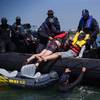Ecuadorean naval officers struggled on Tuesday to right a wrecked ship half a mile (800 m) off the shore of Ecuador's famed Galapagos islands after nearly all the fuel it was carrying spilled into the ocean, threatening some of the world's rarest species. Ecuador's navy said officers were attempting to pull the "Jessica," an 835-ton ship that ran aground near the archipelago's capital, Puerto Baquerizo Moreno, a week ago, back to an upright position from its 45-degree list in order to get the remaining 15,000 gallons of diesel and bunker fuel off the craft.
Some 160,000 gallons of the 240,000 gallons of diesel and bunker fuel -- a heavy fuel used to power tour boats operating in the islands -- spilled on the weekend into the Pacific Ocean waters that are home to tropical fish and sea lions. About 65,000 gallons were removed safely from the ship. The spill threatened animal species native only to the archipelago. Dead fish and other sea creatures were already washing up on beaches of the islands. The spill has also harmed pelicans and other birds as well as sea lions.
Hernan Vilema, the mayor of San Cristobal, an island about half a mile (800 m) from the shipwreck, said late on Tuesday that it was taking longer than expected to get the remaining fuel off the ship because of rough seas.
Late on Monday, Ecuador's government declared a state of emergency in the Galapagos, the ecosystem that served as a foundation for British naturalist Charles Darwin's theory of natural selection, in order to channel funds needed for the cleanup operation. "We have a very, very grave environmental problem. But it's a problem, not a tragedy," Ecuador Environment Minister Rodolfo Rendon said in an interview on Gamavision television on Tuesday.
Sea Creatures At Risk
The Galapagos Islands, 600 miles west of Ecuador's coast in the Pacific Ocean, are home to hundreds of native species -- including giant tortoises and iguanas -- that have evolved over eons with little human intervention. Ecologists have expressed concern that the spill will take its biggest toll on sea creatures and plants that form part of an intricate food chain.
"Near the Jessica, all the invertebrates are dead. Sea urchins and fish are washing up on the beach," Fernando Espinoza, general secretary of the Charles Darwin Research Station in Galapagos, said in a television interview. "Beyond that, it's different. We need another two weeks to monitor the situation," he added.
Officials at the Galapagos National Park said that about 40 sea birds and 10 sea lions had been affected by the spill. One Franklin sea gull died.
Westerly currents have pushed the spill away from the port, thinning it out in patches over some 780 sq. mi. But those same winds had floated the oily film to other islands, namely Santa Fe, about 25 miles (40 km) away, officials said. "They're moving the spill toward very sensitive areas, such as Sea Lion Island, near here, Plazas, Santa Fe, where the archipelago's main sea iguana colony lives," said Eliecer Cruz, director of Galapagos National Park. But the impact had been less severe than expected, said the Darwin Center, as the sun had helped evaporate much of the spilled diesel fuel. "We expect impacts to be widely scattered over three islands (Santa Fe, Santa Cruz and San Cristobal), but of low intensity," the center said in a letter.
Ecuador's Second Navy Zone is conducting an investigation of the accident, which is due to be completed in 10 days. Theories range from the age and condition of the boat to navigational error.
The European Commission called on Tuesday for tougher international laws on maritime safety following the spill. – (Reuters)
Featured videos

Tracking Foreign Vessels Working in the U.S. Jones Act Market

Inmarsat Enhances Service to Drive Digitalization

Unlock Onboard Data Efficiencies
Subscribe for
Maritime Reporter E-News
Maritime Reporter E-News is the maritime industry's largest circulation and most authoritative ENews Service, delivered to your Email five times per week









